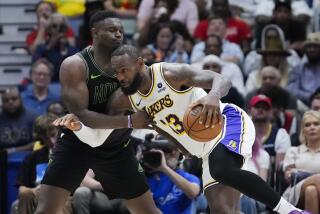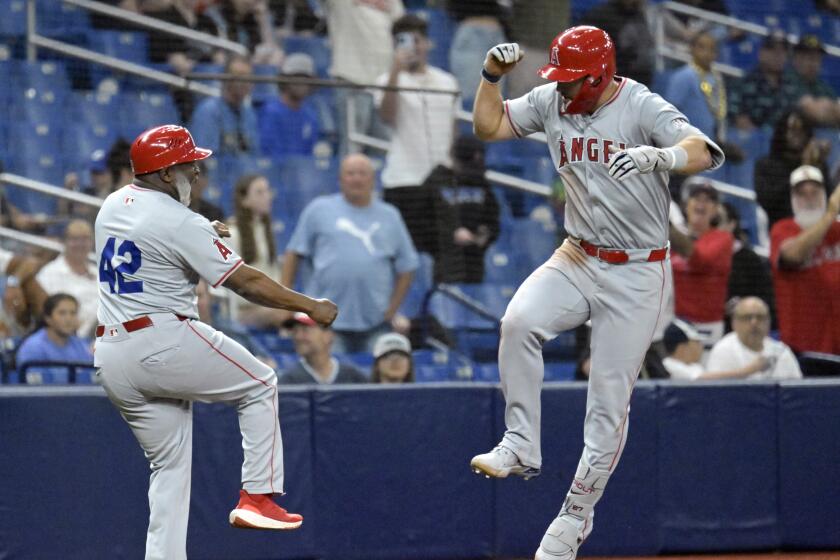A memorable second act is rewriting Muncie’s life story
A man from the bank was calling with what he presumed was good news: Chuck Muncie’s $1-million home loan had been approved.
At the other end of the line, Muncie had no idea what he was talking about. The former California and San Diego Chargers running back had neither applied for a loan nor was looking to buy a house.
He had been scammed.
A victim of identity theft, he was by turns frightened and agitated. But the experience last winter also could be seen as strangely illuminating because it showed just how far Muncie had progressed in reclaiming his good name.
Twenty years ago, nobody wanted to be Chuck Muncie, whose drug addiction had cut short his NFL career and landed him in jail.
Back then, he notes in an interview, “I was spiraling downhill.”
Still, before going to prison in 1989 for selling cocaine, Muncie told the sentencing judge, “I am more than willing to get my life back in order.”
Clearly, he meant it.
His Chuck Muncie Youth Foundation, a nonprofit established in 1997 and based in Oxnard, has helped countless youngsters avoid the bad decisions that nearly destroyed its namesake, providing Southern California youth with alternatives to the street and offering a highly regarded tattoo-removal program.
Muncie, who spends much of his time at his Bay Area home in Emeryville, also spearheads a mentoring program for athletes at his alma mater.
“Whenever we call, he makes himself available,” says Dr. Bill Coysh, director of sports medicine for the Cal athletic department. “That’s what’s incredible about him. This is not a paid position. He does it because that’s how he is.”
If a similar program had been in place when Muncie played at Cal, the former running back says, “it would have made all the difference in the world.”
Or maybe not.
“Back in the ‘70s,” says Muncie, noting that he started using cocaine in college, “everything was about experimentation, and Berkeley was a different place than it is now. It was a different time, and we didn’t have the education we have now on drug abuse, so it’s kind of hard to compare. It’s apples and oranges.”
His past may be less than noble, but Muncie, 55, embraces its lessons.
“Everything I did and everything I went through in my life has allowed me to do the things I’m doing now,” says Muncie, who spent about 1 1/2 years behind bars. “I’ve been able to tell these guys, ‘Been there, done that, and if you keep doing these things, this is what’s going to happen.’ ”
Muncie’s drug use was not so pronounced that it kept him from leading the Golden Bears to a share of the then-Pacific 8 Conference championship in 1975. He was runner-up to Archie Griffin of Ohio State in voting for the Heisman Trophy, even though statistically Muncie had the better season.
“Archie would be the first one to tell you I could easily have won that award,” Muncie says, laughing. “I probably should have.”
The New Orleans Saints made Muncie the third pick in the 1976 draft and, fueled with cash, his drug abuse kicked into high gear.
Still, he ran for more than 6,700 yards and scored 74 touchdowns in nine seasons with the Saints and Chargers, twice topping 1,000 yards in a season. Former teammate Don Reese told Sports Illustrated in 1982 that the 6-foot-3, 230-pound Muncie, a three-time Pro Bowl selection, had to be a “superman” to continue performing at such a high level despite his addiction.
But Muncie says he wasn’t alone in abusing cocaine.
“I’ll never name names,” he says, “but it wasn’t like what I was doing was rare in the NFL or the NBA or major league baseball back then. It was a very prominent thing in sports at the time. I happened to get caught.”
It was, he says, the best thing that ever happened to him.
“If you don’t stop,” says Muncie, a single grandfather of two whose marriage collapsed during his hard-partying days, “you’re going to lose everything and end up dead, homeless or in prison for the rest of your life.”
Instead, he is thriving. A partner in several businesses, among them a high school football recruiting service and another that helps prevent identity theft, he says he was lucky not to lose any money when his identity was stolen.
Muncie went to work for the company -- optoutdetectives.com -- that helped him out of his jam. “We shut it [the scam] down after I heard from the bank,” Muncie says.
Not shut down was Muncie’s determination to lend a hand.
“I think what comes through to anyone, especially young people, is that he has this really big and good heart,” Cal’s Coysh says. “He’s very accepting of people. He doesn’t take nonsense, but that caring comes through.”
If not for his drug abuse, Muncie might have wound up in the Pro Football Hall of Fame, but he notes without regret, “I had a pretty good career.”
His second act, however, has eclipsed his first.
“I’m a very selfish person,” Muncie says, offering a unique perspective, “and I like to feel good. One way I could make myself feel good was by helping other people. I learned, over a period of time, that was something that worked for me.”
--
More to Read
Get our high school sports newsletter
Prep Rally is devoted to the SoCal high school sports experience, bringing you scores, stories and a behind-the-scenes look at what makes prep sports so popular.
You may occasionally receive promotional content from the Los Angeles Times.






